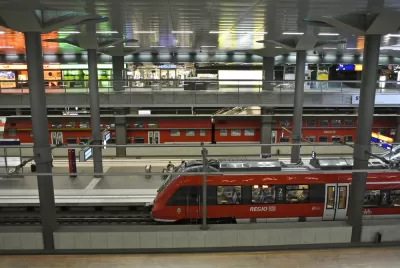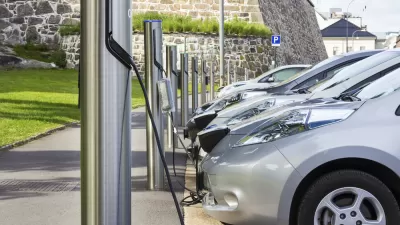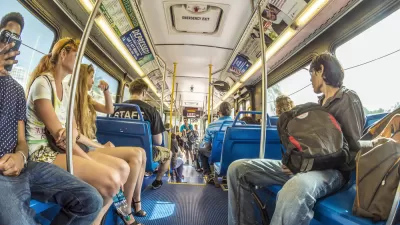With the transportation sector accounting for a third of urban carbon emissions, cities around the world are seeking new ways to electrify their transit fleets and reduce fossil fuel consumption.

As Somini Sengupta reports, more and more cities around the world are taking steps to reduce fossil fuel consumption in their transportation sector and electrify public transit.
Berlin is reviving electric tram lines that were ripped out when the Berlin Wall went up. Bogotá is building cable cars that cut through the clouds to connect working-class communities perched on faraway hills. Bergen, a city by the fjords in western Norway, is moving its public ferries away from diesel and onto batteries — a remarkable shift in a petrostate that has for decades enriched itself from the sale of oil and gas and that now wants to be a leader in marine vessels for the electric age.
"Urban transportation is central to the effort to slow climate change. Home to more than half the world’s population, cities account for more than two-thirds of global carbon dioxide emissions," with transportation as the biggest–and fastest-growing–source, accounting for roughly a third of cities' emissions. Chinese bus manufacturers are taking notice, supplying electric fleets to cities including Los Angeles and Santiago, Chile. Supporters say "the change is audible" as near-silent electric buses replace the roar of gas-powered vehicles.
"At the moment, only 16 percent of city buses worldwide are electric. The electric switch will need to accelerate, and cities will have to make mass transit more attractive, so fewer people rely on automobiles." For the growing metropolises of the developing world, electrification is expensive and challenging. "But where cities are succeeding, they’re finding that electrifying public transit can solve more than just climate problems. It can clean the air, reduce traffic jams and, ideally, make getting around town easier for ordinary people, which is why some politicians have staked their reputations on revamping transit."
FULL STORY: Trams, Cable Cars, Electric Ferries: How Cities Are Rethinking Transit

Planetizen Federal Action Tracker
A weekly monitor of how Trump’s orders and actions are impacting planners and planning in America.

Restaurant Patios Were a Pandemic Win — Why Were They so Hard to Keep?
Social distancing requirements and changes in travel patterns prompted cities to pilot new uses for street and sidewalk space. Then it got complicated.

Map: Where Senate Republicans Want to Sell Your Public Lands
For public land advocates, the Senate Republicans’ proposal to sell millions of acres of public land in the West is “the biggest fight of their careers.”

Maui's Vacation Rental Debate Turns Ugly
Verbal attacks, misinformation campaigns and fistfights plague a high-stakes debate to convert thousands of vacation rentals into long-term housing.

San Francisco Suspends Traffic Calming Amidst Record Deaths
Citing “a challenging fiscal landscape,” the city will cease the program on the heels of 42 traffic deaths, including 24 pedestrians.

California Homeless Arrests, Citations Spike After Ruling
An investigation reveals that anti-homeless actions increased up to 500% after Grants Pass v. Johnson — even in cities claiming no policy change.
Urban Design for Planners 1: Software Tools
This six-course series explores essential urban design concepts using open source software and equips planners with the tools they need to participate fully in the urban design process.
Planning for Universal Design
Learn the tools for implementing Universal Design in planning regulations.
Heyer Gruel & Associates PA
JM Goldson LLC
Custer County Colorado
City of Camden Redevelopment Agency
City of Astoria
Transportation Research & Education Center (TREC) at Portland State University
Camden Redevelopment Agency
City of Claremont
Municipality of Princeton (NJ)





























